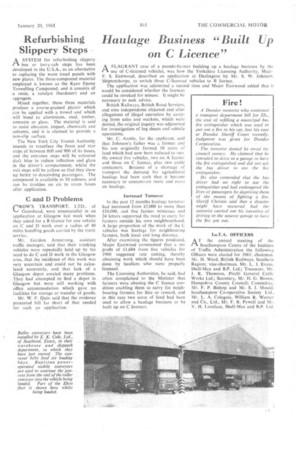Refurbishing Slippery Steps
Page 43

If you've noticed an error in this article please click here to report it so we can fix it.
ASYSTEM for refurbishing slippery bus or lorry-cab steps has been developed in the U.S.A., as an alternative to replacing the worn tread panels with new plates. The three-compound material employed is known as the Ryco Epoxy Trowelling Compound, and it consists of ' a resin, a catalyst (hardener) and an aggregate.
Mixed together," these three materials produce a coarse-grained plaster which can be applied with a trowel and which Will bond to aluminium, steel, timber, concrete or glass. The material is said to resist abrasion, impact, chemicals and solvents, mid -it is claimed to provide a non-slip surface.
• The New York City Transit Authority intends to resurface the front and rear Steps of between 800 and 900 of its buses, and the entrance steps will be coloured dark blue to reduce reflection and glare in the driver's compartment, whilst the exit steps will be yellow so that they show up better to descending passengers. The compound is available in 10 colours, and can be .trodden on six to seven hours after application.
C and D Problems
CROW'S TRANSPORT, LTD., of ‘---• Gateshead, were unsuccessful in an application at Glasgow last week when they asked for a B licence for one vehicle on C and D work over a radius of 40 miles handling goods carried by the trunk service.
Mr. Gordon Armstrong, assistant traffic manager, said that their trunking vehicles were repeatedly held up by the need to do C and D work in the Glasgow area, that the incidence of this work was very uncertain and could not be calculated accurately, and that lack of a Glasgow depot created many problems. They had attempted to find a depot in Glasgow but were still working with office. accommodation which gave no facilities for storage or transfer of goods. • Mr. W. F. Quin said that the evidence presented fell far short of that needed for such an application.




















































































































